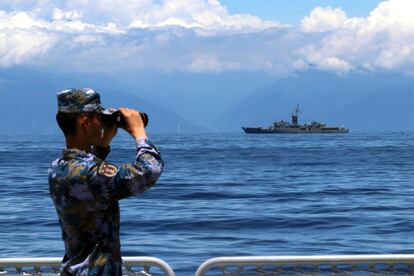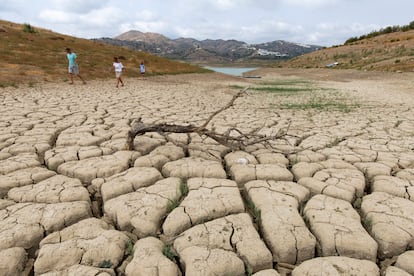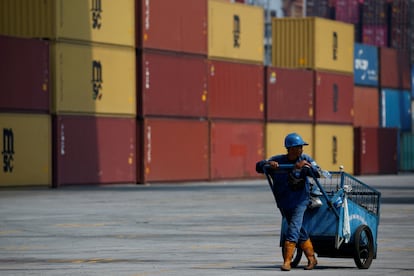The global crises laying waste to a divided world
The pandemic, climate change, wars and trade conflicts show the need for common responses in a geopolitical scenario that is cracking instead of coming together

A brutal pandemic; frightening climate change; a devastating war that drives widespread rearmament; severe trade disruptions; gigantic multinationals that take advantage of loopholes to avoid paying much-needed taxes. The world faces colossal global challenges and addressing them requires close international cooperation. As the Secretary General of the United Nations, António Guterres, stated at the end of July, with respect to global warming, the dilemma is clear: collective action or collective suicide. However, signs of growing polarization and rift abound, between the West and the authoritarian giants of the East, or between the North and the South of the planet. As geopolitical divisions widen due to the Russian invasion of Ukraine, the world is being hit by crises of all different kinds.
The meeting on climate change held in Bonn in mid-June to prepare the COP27 in November in Egypt ended without progress and with acrimony. The Organization for Economic Cooperation and Development (OECD) reported in mid-July that the negotiation it leads to implement a global tax framework for multinationals is delayed and it will not be possible to apply it before 2024 in the best of cases. At the end of July, Russia announced that it is withdrawing from the international space station project. The review conference of the Nuclear Non-Proliferation Treaty (NPT) that has begun in New York is taking place in the midst of strong geopolitical turmoil, dampering optimism. In early August, China announced it was breaking off dialogue with the United States on key issues such as the environment or high-level military meetings in response to House Speaker Nancy Pelosi’s visit to Taiwan.
It hasn’t just been disasters. The ministerial meeting of the World Trade Organization (WTO) held in July achieved a consensus statement that, although minimal, is an important sign of vitality. A recent deal to allow Ukraine to export grain has begun to bear fruit. The US has approved an important piece of legislation that contemplates investments of more than $369 billion over a decade to facilitate the green transition, a national accomplishment but with great global repercussion. There are inspiring episodes of transnational cooperation, such as the EU’s pandemic relief fund.
But the achievements seem insufficient given the magnitude of the crises, and the underlying currents are not at all promising for the near future when it comes to truly global cooperation. The stark rivalry between powers hinders the essential constructive attitudes; the economic slowdown encourages selfish instincts; the specter of a new rise of nationalist and protectionist policies is serious, whether it materializes in the extreme form of a seizure of power – as is likely to happen in September in Italy – or in the inhibiting effect that this influence has on the rulers of another country.
Below is a review of the key areas that require global responses but are being hinded by international divisions.
Weapons
Russia’a war in Ukraine has highlighted, in addition to the impotence of the UN system in cases like this, the seriousness of the collapse of the security architecture that had been built during the Cold War. This important framework of treaties, introudced controls on armaments, increased transparency and decreased the risk of dangerous misunderstandings. The collapse began two decades ago. In 2002, the United States withdrew from the Anti-Ballistic Missile Treaty and more recently withdrew from the Intermediate-Range Nuclear Forces Treaty and the Open Skies Treaty for a wide range of reasons, while Russia took the lead in withdrawing from the Armed Forces Treaty.
This gap is especially serious in a context like the current one, where there is a clear arms race. World military spending is increasing and, for the first time in decades, according to Stockholm International Peace Research Institute (SIPRI), nuclear arsenals are on the way to not only a qualitative improvement, but also a quantitative one. “We have to be aware that the lack of dialogue on nuclear risks and arms control between powers is in itself dangerous, because it makes it easier to misunderstand and miscalculate in a crisis,” says Daryl G. Kimball, executive director of the Washington-based Gun Control Association.

This dangerous trend has been exacerbated by the recent breakdown in dialogue between Beijing and Washington. If the conflict between the West and Russia is worrying given the high military potential at the Kremlin’s disposal, the deterioration of relations with China is even more so. The Asian giant will most likely be a 21st century hyperpower. China is determined to develop war-fighting capabilities commensurate with that status and is traditionally reluctant to engage in arms-control deals in the style of those that helped keep the Cold War from turning hot.
“Unlimited spending on increasingly sophisticated military equipment only fuels an arms race that no one can ultimately win. We need to get back to a point where the major powers are engaged in a constant and fruitful dialogue,” Kimball continues. “With Russia the relationship is broken, and as for China, Washington should recognize that its actions can have a negative influence and Beijing should understand that the US has concerns about its behavior.”
The current NPT review conference in New York is a perfect compendium of the difficulties that complicate the road in this sector. The nuclear powers recognized by the Treaty are in the midst of massive efforts to modernize their arsenals. Russia and North Korea make thinly veiled threats to use it. Iran is leaps and bounds closer to having the capabilities to have a nuclear weapon if it wanted to. Dozens of countries, meanwhile, have ratified the Treaty for the Prohibition of Nuclear Weapons. But both the dialogue between nuclear powers and that between them and the abolitionists seem very complex. A final consensus statement from the conference appears virtually impossible. The hope is that at least a declaration backed by a “supermajority,” as Kimball defines it, will come about. This, however, is “possible, but not likely,” acknowledges the expert.
Climate change
Nor does it seem likely that the world will make coordinated and consistent progress in the fight against climate change in the near future. While the brutal heatwaves that hit Europe remind us of the urgency of speeding up efforts to reduce greenhouse gas emissions, there are worrying signs that progress is being stalled.
Political action in the US to facilitate the green transition is extremely important and will increase the pace of US emission reductions. However, as important as it is, the package is not even enough, according to expert calculations, to meet the 2030 emission reduction goals assumed by the Joe Biden administration. Meanwhile, disruptions in the energy market linked to Russia’s war in Ukraine have precipitated a return to coal in several European countries. China, for its part, has increased the pace of permitting the construction of new coal plants very consistently, according to a Greenpeace report. In the first quarter of 2022, plants for a power of 8.6 gigawatts were authorized, almost half of the capacity approved throughout 2021, when Xi Jinping gave a boost to strongly advance decarbonization. The breakdown of cooperation between Washington and Beijing in this section is a huge blow, as they are the two main emitters of greenhouse gases.

“We live in a very complex context, of concatenated crises that interact. In this context, energy security is emerging as the preponderant variable over the others. Short-term signs don’t look good. And, in the general picture, the commitments made to reduce emissions are clearly insufficient. Even so, we are much better off than a decade ago thanks to the legislative and executive framework that has been built to tackle the energy transition,” observes Lara Lázaro, principal investigator at the Elcano Royal Institute and an expert in the field.
The difficulties in international cooperation in this sector were exposed at the meeting held in Bonn in mid-June to prepare the COP27 scheduled for November in Egypt, which ended without tangible progress. If, the need for energy security drives short-term support for coal and gas, and the economic slowdown stirs up East-West competition, the Bonn meeting illustrated the conflict between the North and the South, with the latter accusing the former of not fully assuming its responsibility for the damage caused to all as a great historical polluter. The issue of mobilizing aid to developing countries to deal with this impact remains an open wound.
The decision of the G7 held in Germany at the end of June to accept exceptions to the commitment to avoid public investment in the fossil fuel sector caused much concern among those who want greater and faster action in the fight against climate change. The taxonomy recently approved by the EU, which classifed natural gas as a sustainable source of energy for investors, also caused controversy.
“At COP26 in Glasgow, among other things, it was proposed to reach COP27 with revised objectives. But I see it unlikely that Europe will get there with greater goals. Perhaps more closed implementation plans. Nor do I see the US or China arrive with increased objectives. Egypt will hold the presidency in a devilish context,” comments Lázaro.
The pandemic
Contributing to the world’s ills is a pandemic that has prostrated the planet for two and a half years. The situation is clearly better than in the previous summer thanks to the vaccination campaign, but the emergency cannot be considered resolved.
The WHO (World Health Organization) continues to record around 15,000 weekly deaths from Covid-19 this summer, and there continue to be disruptions to the economy due to confinements, as was seen in China. And so far, only 20% of the population in Africa is fully vaccinated.
“The international reports that have been prepared – such as that of the Monti commission, to which I was linked – coincide in indicating that the north-south international response has been clearly insufficient and not very supportive,” comments Rafa Bengoa, former Minister of Health of the Government Vasco, former director of the WHO health systems area and currently co-director of the Institute of Health and Strategy.
“Many countries, including Spain, are trying to provide both vaccines and medicines and infrastructure to the countries of the south, but this has been slow, it is not going at the speed at which the virus is going. We are playing more to the security of the north than to the solidarity that we should have,“ says the expert.
This dispute has been seen in the fight to waiver patents for Covid-19 vaccines. India and South Africa have spearheaded the claim. After a time of uncertainty, the Biden administration backed the idea. But the issue remains stalled, and is opposed by several major European producing countries. The recent WTO ministerial conference addressed the issue in its final consensus statement. However, the result was considered practically irrelevant. “It doesn’t change things much,” says Uri Dadush, an analyst at the Bruegel think tank, and a former World Bank executive and president of The Economist Intelligence Unit.
In this context, hopes for better international cooperation are pinned on a process launched within the framework of the WHO. “The idea is to have a legal and binding mechanism that goes much further than the international health regulations of 2005, which were established after SARS-1, and which have proven to be insufficient due to lack of teeth,” observes Bengoa.
The expert points out how the WHO faced serious problems in investigating what happened in Wuhan, China, the likely epicenter of the pandemic, because it does not have the power to act without authorization from member countries. “The framework agreement is going to have to say things about these issues.” But given the global divisions, it may be difficult for the WHO to be granted more far-reaching powers. It should be remembered that Donald Trump, a possible candidate for the next US presidential elections, promoted the withdrawal of his country from the WHO.
Trade
Trade is another area subject to strong tensions for geopolitical reasons or the disruptions linked to the pandemic. Under the Trump presidency, the conflict between the US and China fully broke out. The arrival of Biden has calmed tensions, but not solved the issue. The highest arbitration panel of the WTO for disputes between states is inoperative as the necessary judges have not been appointed, with the United States convinced that the court exceeded its powers in the past. The relationship between the other great world trade giant, the EU, and China is not serene either. The sinking of the investment agreement between the two, once heavily sponsored by Germany, is a symbol of growing suspicion in Europe about Chinese attitudes and excessive interweaving with that market. The Russian war in Ukraine has shaken up relations, with a wide range of retaliatory sanctions against Russia by some 40 democratic countries.
Still, the recent WTO ministerial conference concluded with a consensus agreement. “This is positive. The WTO is a fundamental institution, and many other ministerial ones ended up without it,” says Dadush, who, however, points out that the agreements found are of a “minimalist” nature, and that the declared intention to reactivate the arbitration panel by 2024. “It doesn’t really commit anyone.”

Dadush points out that the current turmoil – tariff conflict between the US and China, sanctions on Russia or the UK’s exit from the EU – while significant, nevertheless represents “a small part of global trade.” The expert believes that the most likely future scenario is that of “free trade that will go ahead, a globalization that will continue, with many difficulties and tensions, but without a global trade war.”
The hypothesis of an open war between China and the United States is the only circumstance that can profoundly alter this central perspective, Dadush observes. “But I think that everyone is aware that we cannot afford an open war between Washington and Beijing, that it is necessary to find a modus vivendi, and that is why that is not the most likely scenario,” Dadush continues.
“I also believe that even if nationalist and protectionist options come to power in Western countries, they will also be limited, in the transition from campaign rhetoric to government action, by the reality that trade is essential,” he said. In this sense, it should be noted that the right-wing coalition dominated by protectionist parties that is the favorite to win the elections in Italy issued this week supposedly reassuring signals in the face of the European integration process, in which free trade is a central issue. It remains to be seen if they will live up to their words if they win.
Taxation
Another blow to the hopes of finding global solutions to global problems came this July when it was confirmed that the negotiations to implement a global corporate tax system are facing many difficulties and will not be able to conclude this year as many expected. Last year, 140 countries agreed to establish a framework that allows taxes to be collected more fairly from large multinationals that take advantage of their size, the characteristics of their business and jurisdictions with negligible tax levels to avoid paying taxes on their profits. The agreement provides for a minimum corporate tax of 15% and that at least part of the profits of multinationals be registered in the jurisdictions where their clients are, and not where their headquarters are, conveniently located.
But the application in the real world is complex, and the OECD, which is leading the negotiation, has reported that at least one more year will be necessary and the implementation would not be possible before 2024. The legislative package approved this Friday in the US contemplates various tax measures but, as recognized by the Treasury Department itself, promoter of the global agreement, they do not serve to place the country in line with the framework agreed upon in the OECD.
As if the obstacles to global cooperation in all these sections were not already notable, others are on the way, such as the US midterm elections in November, which could break Democratic control of Congress. It is expected that, with the Republicans in control of one or both Houses, Washington’s willingness to cooperate internationally will be diminished, giving yet another turn to a spiral that goes in the opposite direction to the direction required by the crises that afflict the world.
Tu suscripción se está usando en otro dispositivo
¿Quieres añadir otro usuario a tu suscripción?
Si continúas leyendo en este dispositivo, no se podrá leer en el otro.
FlechaTu suscripción se está usando en otro dispositivo y solo puedes acceder a EL PAÍS desde un dispositivo a la vez.
Si quieres compartir tu cuenta, cambia tu suscripción a la modalidad Premium, así podrás añadir otro usuario. Cada uno accederá con su propia cuenta de email, lo que os permitirá personalizar vuestra experiencia en EL PAÍS.
¿Tienes una suscripción de empresa? Accede aquí para contratar más cuentas.
En el caso de no saber quién está usando tu cuenta, te recomendamos cambiar tu contraseña aquí.
Si decides continuar compartiendo tu cuenta, este mensaje se mostrará en tu dispositivo y en el de la otra persona que está usando tu cuenta de forma indefinida, afectando a tu experiencia de lectura. Puedes consultar aquí los términos y condiciones de la suscripción digital.









































